Like other unnecessary things in life, wisdom teeth can be tolerated until they begin to cause trouble for your oral health. Normally, these teeth may erupt when a person is 17-25 years old. For some people, they never cause any issues or even appear. But it is important to understand what they are and the difficulties they can cause in case the time comes to be proactive with problematic tooth removal. Also, if you decide to act, what do the procedure and ensuing recovery entail? To find out, continue reading or contact our team!
What Are Wisdom Teeth?
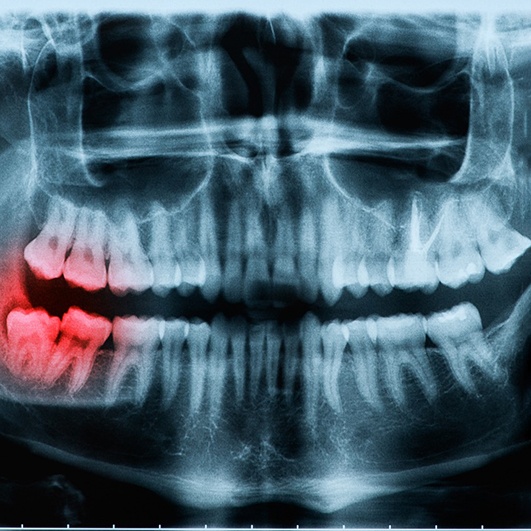
Wisdom teeth are the third set of molars at the very back of the mouth. Most people have four of them – one in each quadrant of their mouth. However, some people have only one or two.
They tend to develop long after the other adult teeth have already grown in when a person is older and “wiser” than they were years ago. Most scientists agree these teeth are largely unnecessary for modern humans, but they were essential for our ancestors who ate a very rough diet.
Why Do Wisdom Teeth Need to Be Removed?
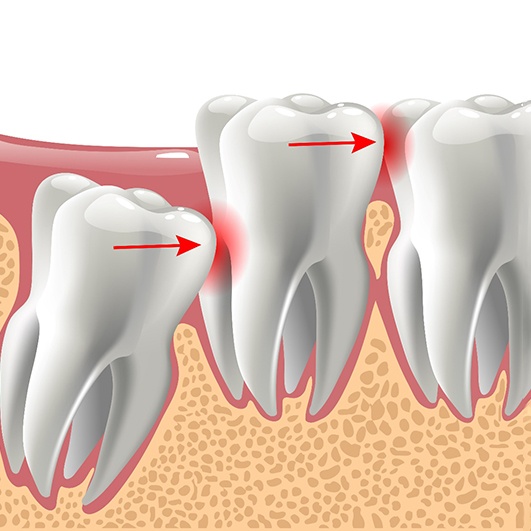
Wisdom tooth removal is not always necessary, but that changes when these teeth pose a threat to a patient’s oral health. If your wisdom teeth are currently causing any of the following problems, or it is deemed likely they will do so in the future, your dentist in Barnegat will recommend you get them extracted:
- Overcrowding: The wisdom teeth can push against your other teeth causing overcrowding and misalignment.
- Infection: The wisdom teeth can be difficult to clean which means they could accumulate food particles and bacteria to easily become infected.
- Cysts and tumors: Cysts can form when fluid builds up around a tooth. This can damage the jawbone and shift the tooth out of place.
If you ever experience any discomfort around your wisdom teeth, you may require emergency treatment, so do not hesitate to call us for a same-day appointment.
What to Expect from the Wisdom Teeth Extraction Procedure
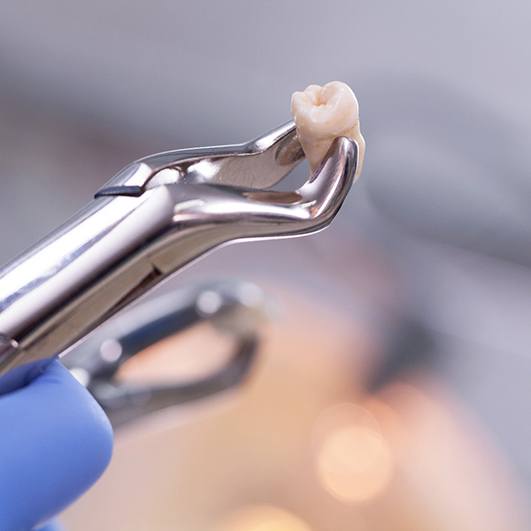
If your wisdom teeth have fully erupted, we may utilize basic extraction techniques to remove them. That means we will use dental forceps and an elevator to gently extract them.
However, if the teeth are fully or partially impacted (stuck beneath the gumline), surgical techniques might be required to get them out. In that case, Dr. G will refer you to an excellent oral surgeon.
No matter the details of the procedure, it’s always a priority to keep you comfortable.
Recovering from Wisdom Teeth Extraction

Most people feel better within a week or so of their wisdom tooth extraction in Barnegat. In the meantime, swelling and facial soreness are normal. Some bleeding may also occur. You must be careful not to disturb the blood clots in your extraction sites.
You should eat soft foods, avoid drinking through straws, avoid smoking, and be very careful when performing oral hygiene tasks. If you have any questions or concerns during your recovery, we’ll be ready to help.
Understanding the Cost of Wisdom Tooth Extractions
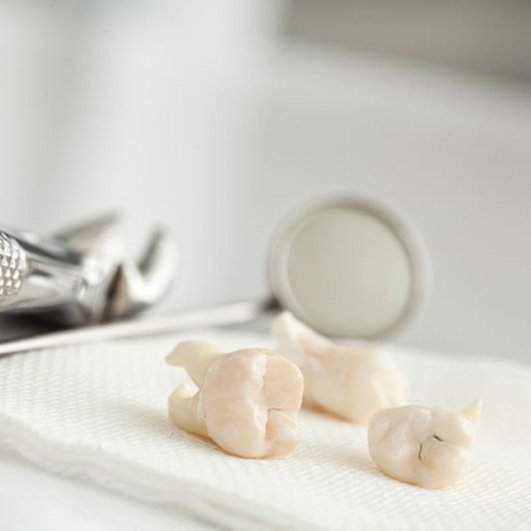
The cost of wisdom teeth extractions varies from case to case. It depends on a handful of different factors. When you attend your consultation, we can talk about specific numbers. Although wisdom tooth removal can seem pricey at times, keep in mind that it may be necessary for your long-term oral health. It can prevent future problems that could end up costing much more than timely wisdom tooth extractions. Therefore, it may actually help you save money.
Read More
Factors That Can Impact the Cost of Wisdom Tooth Extractions
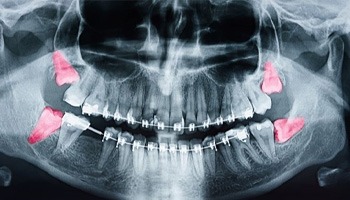
Some factors that may have a bearing on the cost of wisdom tooth extractions include:
-
How many wisdom teeth need to be removed.
Some patients choose to have all of their wisdom teeth removed at once, whereas others choose only to remove the ones that are currently causing problems. Also, people have varying numbers of wisdom teeth. Most have four, but it is possible for a person to have more or fewer.
-
Whether or not the wisdom teeth are impacted.
When a tooth is impacted (stuck beneath the gumline, either in the soft tissue or the bone), it is more challenging to remove than if it is fully erupted. Often, we refer patients to a specialist for the removal of impacted teeth. Specialists may have a pricing structure that is quite different from ours.
-
If you choose to be sedated during your wisdom tooth procedure, that can add to your total bill. Different types of sedation come with varying price tags.
Does Dental Insurance Cover Wisdom Tooth Extractions?

Often, dental insurance does cover wisdom tooth extractions. Usually, the procedure is classified as a major service or oral surgery, so around 50% of its cost might be covered, up to the amount of your plan’s annual maximum. With the help of insurance, some patients are able to save $1,000 or more on their out-of-pocket expenses. Nu Dental of Barnegat is in-network with several popular plans, and we will be happy to help you maximize your benefits.
Other Options for Making Wisdom Tooth Extractions Affordable

Beyond insurance, there are a couple of provisions that may make it easier to afford your wisdom tooth extractions:
-
Nu Dental’s in-house membership plan
.
In exchange for a reasonable fee, you can enjoy all preventive services and a discount on additional procedures, including wisdom tooth removal.
-
Most patients qualify for low-interest financing through a third-party lender, such as CareCredit. Our team can help you with your application.
Wisdom Tooth Extraction FAQs
How Should I Prepare for My Wisdom Tooth Extraction?
We’ll give you some instructions to help you prepare for the extraction process. The exact details may vary depending on your specific needs, but usually you should plan to:
- Arrange to have someone else drive you home while you’re still under the effects of sedation or anesthesia.
- Avoid smoking for at least 12 hours before the procedure.
- Stock up on soft foods that you can easily eat while your mouth is still recovering.
- Wear glasses instead of contacts since your eyes will be shut throughout the extraction process.
How Do You Make Wisdom Tooth Pain Go Away?
The only way to stop wisdom tooth pain for good is to have them removed. That said, there are steps you can take to reduce your discomfort while you’re waiting for your treatment. You can apply an ice pack wrapped in a towel to the outside of your cheek for 20-minute intervals. Over-the-counter pain medication like ibuprofen can also help, but if you take aspirin, do not let it directly touch the affected area.
To reduce swelling and keep the area around your wisdom teeth clean, we recommend rinsing with a salt water solution. Swish it around your mouth for about one minute before spitting it out; do not swallow it.
How Soon Can I Eat After Wisdom Tooth Removal?
You should normally wait at least one or two hours after wisdom tooth extraction before you eat anything. Trying to bite or chew anything while your mouth is still numb could cause you to bite your tongue or the inside of your cheek without realizing it, which can result in considerable pain later. Generally speaking, you should plan on only consuming liquids on the first day; after that, your diet should consist of soft foods until the soreness in your mouth has faded.
Are Wisdom Tooth Extractions Covered by Insurance?
Most of the time wisdom tooth removal is considered medically necessary; as such most dental insurance plans will cover a portion of the cost of the procedure. Typically, coverage is around 50% (not accounting for your deductible or annual maximum), but the exact details will vary depending on which dental insurance carrier you have.
Our practice is currently in-network with many popular dental insurance providers including Delta Dental, Cigna, MetLife, and United Healthcare. We also accept out-of-network providers, and we’ll take whatever steps are necessary to help you receive the most savings possible.








